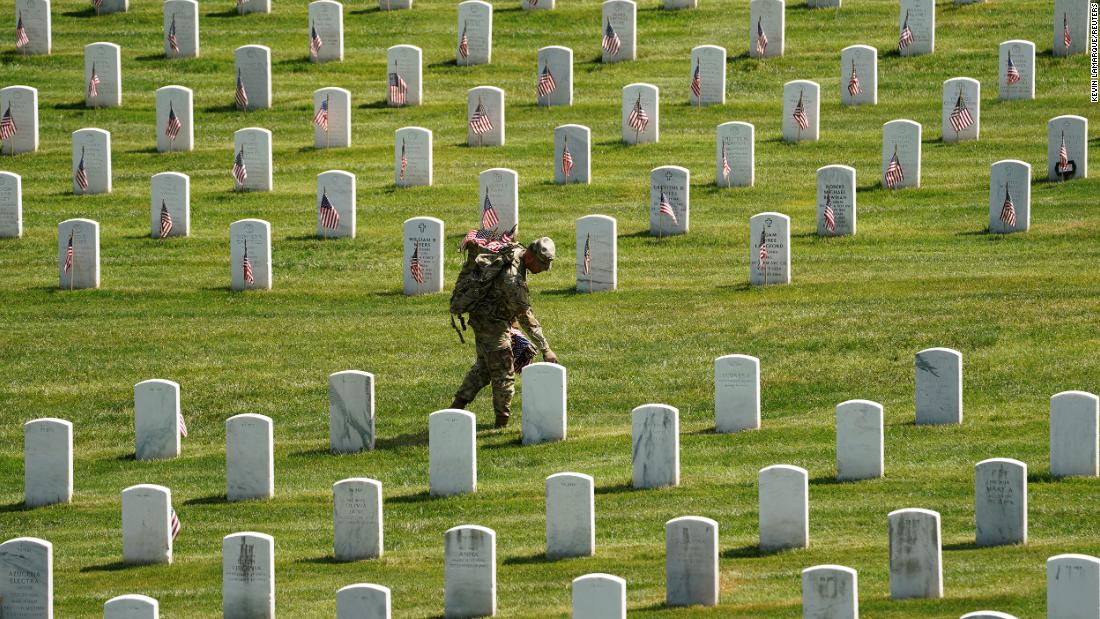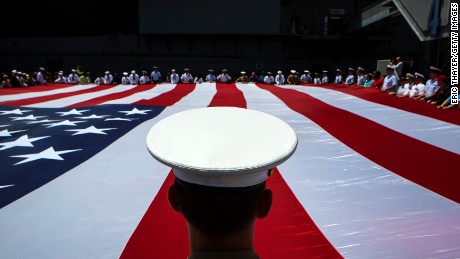Analysis: A particularly somber Memorial Day
Our lead story was about fake bomb threats against commercial airplanes — including an international flight heading for New York’s JFK Airport. Military fighter jets intercepted and escorted the plane safely to the ground, and passengers were held for two hours as FBI agents searched the plane.
“So inconvenient on a day like today,” I said to the reporter, lamenting the headache for travelers on the long weekend.
We closed the show with a moment from the Memorial Day commemoration at Arlington National Cemetery — after the bugle call of “Taps” and remarks from President Barack Obama and Gen. Martin Dempsey, then the Chairman of the Joint Chiefs of Staff, who asked Americans to honor the families of service members killed in wars and consider them on days other than Memorial Day.
“Tomorrow, when you resume life’s daily routines, take a moment to think of the families who will return home and leave their loved ones here in this sacred place, and what of next week and next month,” Dempsey asked. “What should we do then? Remember.”
But I didn’t. Not really. I thanked our viewers for joining us for the tribute on Memorial Day, then I unclipped my mic, walked off the set and went home to pack a bag for a trip to a friend’s wedding. And I’m pretty sure I didn’t give the true meaning of the day much more thought.
A year later in 2016, I spent part of Memorial Day in Section 60 at Arlington National Cemetery, where service members killed in the wars in Iraq and Afghanistan are buried, as my new boyfriend, an Army Special Forces officer, visited the graves of his dead friends.
As we walked, I saw a woman laying on her side on a blanket in front of one of the white headstones, her knees slightly bent, as if someone was spooning her. I imagined her with her husband like that when he was alive. She was shading herself from the midday sun with a large umbrella. This was not a short visit to his grave.
Several rows away, a group of guys stood circling another grave where they had set an unopened beer on the headstone — no doubt their buddy’s — as they drank, talked, smiled. They wouldn’t have been out of place at a backyard barbecue.
I felt embarrassed as I witnessed these moments. If I’m being honest, I felt shame. I normally spent Memorial Day unencumbered by what the holiday actually means and I felt like a voyeur, taking in these vignettes of remembrance and grief that I had effectively ignored, despite years of covering the wars in Iraq and Afghanistan from a distance — congressional debates over policies like the extension of the Patriot Act, protests and, on occasion, communities mourning a local service member killed overseas.
I’ve since married into the military and now, every year, the Memorial Day weekend approaches and settles over my house like the anniversary of the death of a loved one, which I think most civilians can connect with.
Today, there is something particularly somber about this day.
“Was it worth it?”
Anger. Resentment. Relief. Uncertainty.
These were the recurring emotions of more than 20 veteran and active duty service members, spouses, parents, siblings and children CNN Home Front interviewed.
Most describe their lives having been forever changed by the war in Afghanistan. Almost all of them said they felt relieved that the war is coming to an end as they struggle to grapple with the cost it has extracted from them.
“You can’t stop questioning if it was really worth the sacrifice,” says a military spouse whose husband deployed twice to Afghanistan and now battles PTSD.
Traci Voelke, whose husband, Maj. Paul Voelke, was 36 years old when he was killed in Afghanistan in 2012, is immensely proud of her husband’s service.
“I would’ve married him all over again despite what I know now,” she says. But she is comforted that other Americans won’t lose loved ones in Afghanistan.
After learning of the troop withdrawal, she is experiencing a feeling that has eluded her.
“For me, personally, the hard part about traumatic grief is the lack of closure. I never got to say goodbye. There’s definitely sadness associated with (the end of the war) but there’s also a sense of closure.”
In total, 2,312 service members have died in Afghanistan, according to the Defense Department, but that number doesn’t represent all of the lives lost at home from service-related illnesses and suicide.
“Although Adam died stateside, we lost him in Afghanistan as well,” said Jane Wolfel, whose son, Adam, died by suicide after returning from a deployment.
Adam’s dad, Mike, hopes money saved by bringing troops home from Afghanistan can be invested in the mental health of service members.
“We witnessed enormous resources and money spent on our son’s unit in preparation of his deployment to Afghanistan,” said Adam’s father, Mike. “Unfortunately, upon return from the combat deployment we witnessed a lack of support towards decompression and reintegration [into] the non-combat environment.”
Many families describe the difficulties of their service members returning from deployments. The time they were apart — years for some families — has taken its toll.
“My son was so little, explaining 300 days to him was out of the question,” said Reda Hicks, whose husband recently retired as a chief warrant officer in the Army, where he made multiple deployments to Afghanistan.
“Answering the questions about when dad would be home every single day wore on me so badly, I actually wound up making a huge paper chain for (my son Howie), with the number of chain links matching the number of days left. At first, it wrapped around our bannister from the second floor. We tore one off every night before bed, and it helped my son understand the bigness of time away, but that it was getting smaller.”
“It’s hard when your dad’s away. It’s hard to send someone you love to war,” said 11-year-old Howie, who was just 4 when his dad returned from his last combat tour in Afghanistan.
Sgt. 1st Class Edwin Irizarry, who deployed twice to Afghanistan before retiring, said he missed “being able to support (my wife) while she handled the diagnosis of our youngest on the autism spectrum,” as well as birthdays, anniversaries and watching his children grow.
“Our older daughters needed individual therapy during (one) deployment,” said Maggie Meza, whose husband Julio served in the Marines in Helmand Province.
Their son was just 1 years old when Julio deployed.
“Even though we showed (him) pictures and talked about ‘daddy,’ (he) didn’t recognize his dad when he returned. Our older daughters were always worried their daddy wouldn’t come back,” said Maggie Meza.
“While my ex-husband did not lose his life overseas, my boys and I lost parts of him in every deployment until he became someone I don’t recognize,” said one divorced spouse I spoke with, even as she said she gained confidence and independence managing her family while her then-husband deployed several times.
Families are changed forever
Many military spouses said they were proud of the resilience and strength they developed through the course of weathering deployments. And some described accepting the difficult reality that their families have forever been changed by the physical and mental scars of war.
“We have learned to come together as the family we are today. We’re not ‘all better.’ We are a new normal,” said one spouse whose family was in turmoil because of her husband’s significant mental health struggles until he was diagnosed and treated for PTSD. CNN isn’t naming some of the family members because of the sensitive nature of their comments.
An Army spouse whose husband deployed multiple times to Afghanistan recalled the high point of being reunited after a deployment — “a beautiful time,” she called it — and the terror of learning that her husband had been injured in an IED explosion.
“Just because service members make it home doesn’t mean the war is over,” she said. She is now a full-time caregiver to her husband.
Carol Collier lost her son, Army Staff Sgt. Dustin Yates, to suicide. He had deployed four times after enlisting in the Army, including once to Afghanistan.
“My son was proud to serve and loved every minute of his service,” Collier said. But she thinks the burden of almost two decades has been too much for an all-volunteer force to bear.
“As long as we have a mission there, I am not opposed to troops being deployed, but I worry that we are unnecessarily stressing the same people over and over by repeated deployments,” Collier said. “The draft isn’t a popular idea, but as Americans, we all should do our part if we are going to keep troops deployed.”
The burden of these few men and women — this is what’s at the heart of Memorial Day as military-connected Americans experience it and the Memorial Day that most civilians will experience today.
Less than half of 1% of Americans currently serve in the armed forces, and military service is a family business unlike any other.
Seeing this holiday as a long weekend to relax and usher in the summer with beer and brats on the grill isn’t a problem. Many military families will be doing the very same thing.
But doing only that is a sign of just how disconnected most of the country is from their armed forces.
And if most Americans are disconnected, divested from the human cost of war, the price will be higher because of it, paid for by a small part of the population — and the rest of the country might not even notice.
![]()






